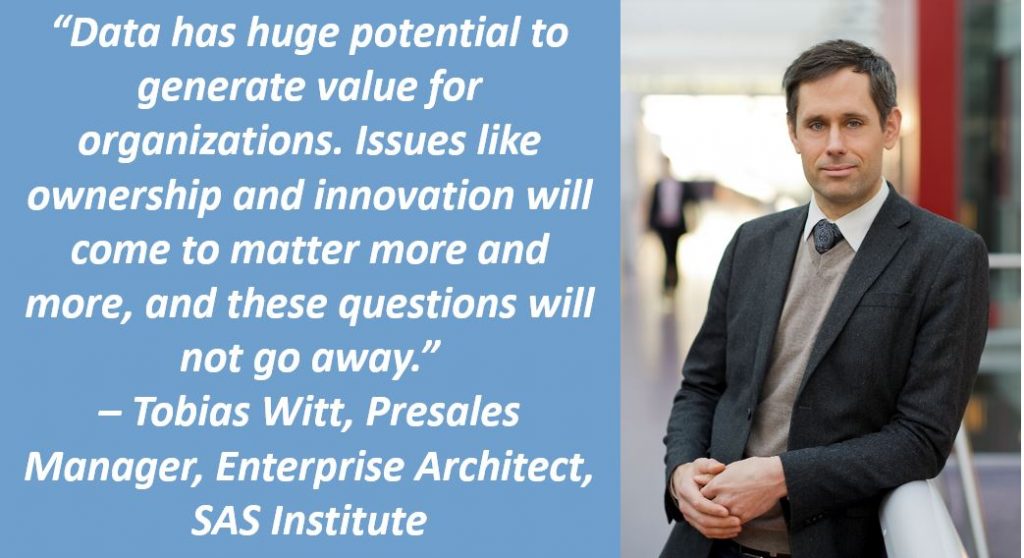Data, it has been said, is the new oil. Indeed, according to Gartner, 90% of organisations apparently believe that data is an asset. But just having lots of data is not enough to ensure success: you also have to know how to use it to generate value. And in this area, younger, more agile companies are winning hands-down.
Why does data favor these ‘early movers’?
The business environment understands inherent advantages of early movers. As Maxwell Wesse, Aaron Levie and Robert Siegel argue in “The Problem with Legacy Ecosystems” this applies to data exploits too.
There are three characteristics of data that favour early movers. The first is that it is scalable. Unlike physical products, services and digital products are relatively easy to scale. Software can be used in any location, with minor adjustments for language. There is no incremental cost such as training new staff. This is a huge advantage.
The second is that data can be protected. It is practically impossible to steal data by poaching staff from a competitor. Nobody can carry millions of individual pieces of data in their heads. And even if an algorithm can be replicated, it is much less valuable without supporting data.
Finally, data is reinforceable. Each customer interaction generates more data, enabling models to be updated and upgraded. In other words, as customers interact more with the service, the algorithm learns more about their preferences and behaviours. Its predictions become more accurate, and this in turn provides more and more value to customers.
The importance of information value management
Given that 90% of organisations believe that data is an asset, it is astonishing to discover that only 10% actually measure the value of information. (Slides in Swedish)
Imagine what the reaction would be if only 10% of organisations gathered financial data, and could report return on investment. Or if companies could not account for their investment in technology, and simply failed to measure activity in any way. Auditors would have a field day. Shareholders and other stakeholders would be up in arms, and rightly so. The idea of not being able to account for money is unthinkable, so how is it acceptable not to measure the value of information held by the organisation?
Being data-driven is about giving decision makers the power to explore data and make predictions. Help your business stakeholders with tips from this collection.
This is not simply a matter of regulation, or of the novelty of having large amounts of data. There are regulations about holding and managing information, just as there are requirements for financial probity. Indeed, organisations are more likely to measure value from technology, which is not regulated, than they are from information, which is.
Some of this is to do with developing the right metrics. It is hard to measure value from information. But those companies which bother to do so are likely to reap rewards.
Generating value: monetising your data
How, then, can companies monetise the data that they collect?
There are three main strategies for data monetisation. The first is to sell the raw data. This is probably the simplest option, and you do not need to do anything with the data except make sure that you can reuse it legally. The market, however, is likely to be unforgiving of poor quality data, so care is needed. The second option is to do something useful with the data to generate insights, and then sell these insights. This is what investment analysts do routinely. Finally, you can offer a service to help customers take advantage of the insights.
But just having a strategy for monetising your data is not enough. You also need a platform, and the right attitude towards data monetisation. Companies that have successfully monetised their data are all very innovative, and their attitude to risk and reward is similarly entrepreneurial. They value innovation in their employees, and this is the third ‘leg’ of the requirements: the right people. Yes, you need data managers, and data scientists. But most importantly, you need innovators who will come up with the ideas for new ways to monetise your data. Without them, you are very unlikely to succeed in generating much value.
The final challenge to monetising data, especially big data, is ownership. Who exactly owns big data? This is a big question, and there are no easy answers, because it depends on the data: both where it is generated, and by whom, and also the value that is placed on it by others involved, including the data subjects.
One thing, though, is certain. Data has huge potential to generate value for organisations. Issues like ownership and innovation will come to matter more and more, and these questions will not go away. Companies need to start thinking about them now if they are to succeed in the future.


